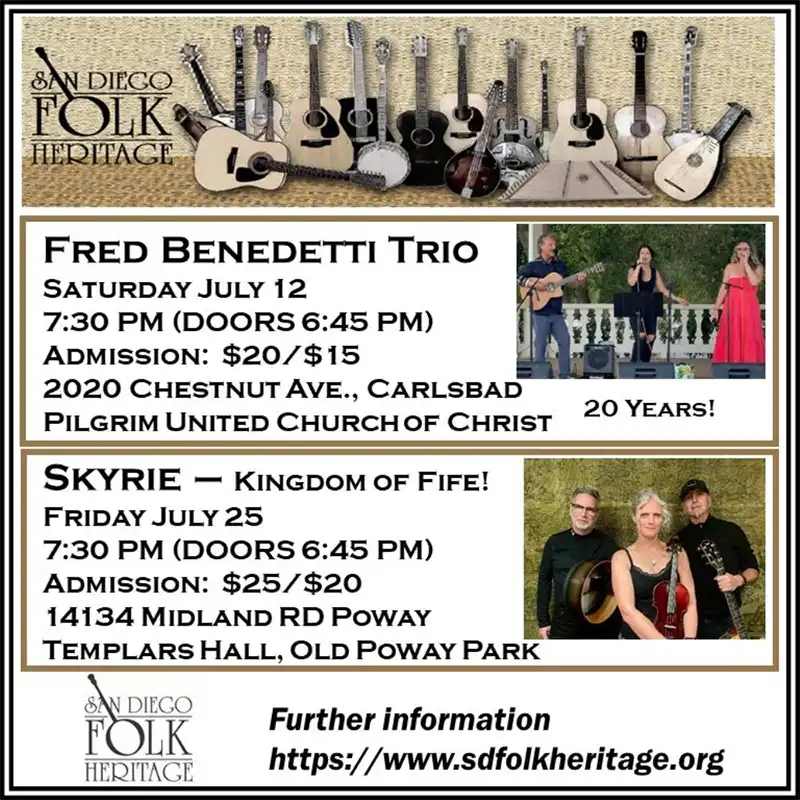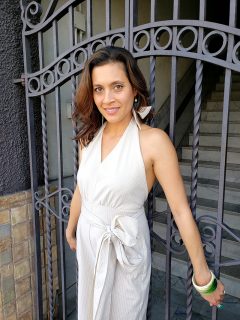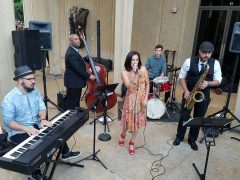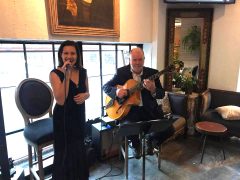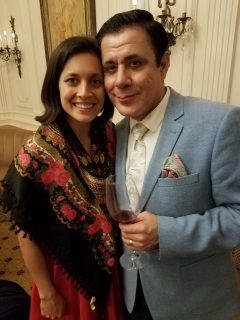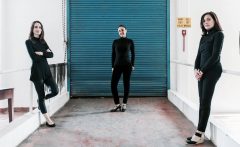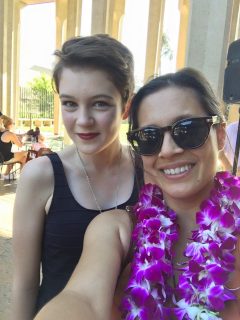Cover Story
Lorraine Castellanos: Seeking the Light
I’m pretty sure that the first time I witnessed Lorraine Castellanos fronting her own band was in 2012 at 98 Bottles in Little Italy. She was doing a tribute to Billie Holiday, and although I usually don’t dig those kind of affairs, this one worked, in part because both singers share a similar approach to phrasing and sound.
I’d heard her before, of course, at jam sessions and as a surprise guest with her trumpet virtuoso husband Gilbert all over San Diego.
Leading a red-hot band featuring pianist Ed Kornhauser, bassist Rob Thorsen, and the undersung drum hero Brett Sanders, Mr. Castellanos opened the show, but from there on out it was all Lorraine, telling stories of heartache and loneliness, armed with a laser-focused sense of pitch, swinging phrasing, and clear articulation.
Since then, I’ve enjoyed her music on dozens of occasions. She also plays an excellent classical guitar, having earned a master’s in that neck of the woods from San Diego State back in 2012. Lorraine also co-founded one of San Diego’s most alluring ensembles, Besos de Coco, an all-female trio with tap percussionist Claudia Gomez and bassist Evona Wascinski in 2010. They were playing a hybrid fusion of world music with light classics and tap that no one had ever seen before. Sadly, that group disbanded a few years back, reforming with guitarist Beston Barnett to focus on a more gypsy-jazz oriented aesthetic.
Since then, Lorraine has played a ton of intimate duo gigs—often accompanied by guitarist Bob Boss (who was her guitar instructor at San Diego State), and she’s also led several trios at the Westgate Hotel, many of which featured the legendary bassist Marshall Hawkins. Her favorite vehicle for expressing her blues-based take on the Great American Songbook is the Lorraine Castellanos Sextet, which, due to economic reality, doesn’t gig all that often.
Lorraine’s talents as a vocalist and guitar player are rather obvious, but she has a few skills that many of her fans might be unaware of. Having grown up the daughter of a contractor, she’s very handy with a hammer and saw, and she’s not afraid to tackle a wide variety of home improvement projects, although she has decided to take a more conservative approach toward saving her hands in the future.
Lorraine and I sat down to discuss all of this and more, and I found her to be disarmingly real and brutally honest.
“Working with Lorraine is so much fun. I really enjoyed the music blend when we were playing together it’s not something you hear everyday. She’s a wonderful guitarist and she’s got such a beautiful voice so it was a joy to make music with her. She’s also a wonderful person and we’ve become really good friends so she’s like family to me—we’re like sisters.”
—Claudia Gomez
In the Beginning
“I was born in South Carolina in 1981,” says Castellanos, momentarily affecting a southern drawl while simultaneously suppressing a laugh. “My father [Tom]was in the Navy and he met my mom [Lucy] in the Philippines. He was an orphan from Chicago who joined the military. After he married my mom they came back to South Carolina where he was stationed. After I was born, we came to San Diego and I’ve been here since I was four months old.”
So what is your first childhood memory?
“My best friend and I used to make believe that we were camping at her apartment complex—we would pack a lunch and then pretend that the staircase was a mountain. We’d climb up halfway and strap ourselves to the railing and then break out our lunches.”
Lorraine’s parents divorced early and after moving around quite a bit, she and her mom and her stepdad [Mark] ended up in Rancho Penasquitos, where she spent most of her early life. I wanted to know if there was music in the house and whether she came from a musical family.
“My mom used to sing karaoke all the time and when she was young she actually played the guitar. So when I was little, my dad Mark and I got her a guitar once for Christmas. We actually wrapped it up as if there was any way to hide what it was. That guitar ended up in a closet for many years until my uncle came to visit from the Philippines and he started playing it. Once I heard him do that, I asked him to teach me, and when he went back, the guitar became mine. My biological father was musical as well; I found out many years later that he played the harmonica. There was a lot of music in the house. My dad, Mark, played Pink Floyd and a lot of the classic rock stuff. My mom liked a lot of soft rock so she would listen to George Michael and Air Supply and, to this day, I love all types of music. Later on, left to my own devices, I turned to heavier stuff like Led Zeppelin and Black Sabbath and I listened to a lot of hip hop as a kid. It was all pop music; we didn’t have any jazz or classical music floating around the house.”
Was it a Happy Childhood?
“I don’t know. I was a sad child, a troubled child. I was kind of off in my own world—I wasn’t very comfortable talking with other kids at school. I do remember going to work with my mom where she did men’s hair—and I would sit there and tell her clients jokes and riddles to pass the time. So, I guess even early on there was some performer in me. But I enjoyed being by myself; I liked being alone, playing with my toys or, later on, playing my guitar.”
How Did You Navigate Elementary School?
“It was a struggle at first trying to figure out how to act in a kind of foreign culture. My mom is from the Philippines and she had a much more conservative idea about what I should be doing. If my friends would invite me out, that wasn’t going to happen because she wanted me home watching my sisters or cleaning the house.”
How About Middle School?
“Middle school was miserable for me,” says Castellanos. “Kids made fun of me—it was not fun. I did make some friends, but I was a horrible student, especially when I got to high school. I really didn’t want to be there. I had a hard time learning how to focus. I started playing my mom’s guitar when I was 15, and then I got transferred to a performing arts school in my senior year. That was pretty cool, and I managed to graduate in the top 15 of my class. Of course, there were only 15 people in the class, so there’s that! Around that time, I bought an electric guitar and started learning more complicated songs [sings brief excerpt from “Stairway to Heaven”].
“I also loved doing the karaoke thing. My mom would always say [imitates Filipino accent], ‘Lorraine, sing “Me and Bobby McGee.’ That was my jam. Like I said before, I was kind of a sad kid, so I went to a support group where all the sad kids went and I made some friends there [laughter]. I was kind of neutral so I was able to hang out with kids from all the different cliques.”
When Did the Urge to Perform Outside of Karaoke Begin?
“At the time, I was practicing and practicing; we lived in a house behind the guy in Unwritten Law [Scott Russo] so I would hear him rehearse and I knew I wanted to play for people. So, at about 16 or 17, I started taking my guitar down to Java Joe’s and I’d play a few songs—which was nerve-wracking, but I was addicted! Even though I had intense stage-fright issues, I kept doing it. I think it was good for my soul.”
Although she loved singing and playing her guitar, beyond that Lorraine didn’t really have a “master-plan” for life outside of high school.
“I thought I might study business and become a music manager or something,” she recalls. “I went straight from high school to Cal State San Marcos, but that was a disaster and I dropped out after one semester. I wasn’t ready at the time, and it took years before I was in a place to really focus on my education. Once I was ready, I had to do a lot of work to clean up my transcript. I did a lot of
different things during that phase of my life—I worked at a hotel, but I was kind of aimless. I didn’t have a clear vision or a passionate drive until I hit 23, I think.”
“It’s a pleasure pretty much every time to play with her. She’s got very eclectic tastes and I’m the same way, so we can choose music from many different genres and try to make it our own. She’s a serious musician who knows how to have fun. She’s able to stretch her self musically while still communicating with the audience. You don’t find a lot of singers who can play guitar like she can, which makes her even better as a performer.”
—Bob Boss
Learning to Love Learning
So what inspired the turnaround?
“I started taking some music theory classes at Grossmont College and a few at Mira Costa and, all of a sudden, this hunger for knowledge started to take over me. Something clicked inside and I started to love learning. It was addicting.”
Around that time, she started pursuing gigs more and more, but without much success.
“I did a handful of gigs, but it was a struggle. In the early 2000s, I put together a demo tape and I made a flyer with my picture on it; I went door-to-door to every venue I could find, asking if they were interested in live music and I got turned down by almost everyone—although I did score one gig for $30.”
Even if the professional musician thing looked pretty bleak, Lorraine was finding salvation through education.
“I met Fred Benedetti at Grossmont [College]. He was teaching there and he changed everything for me. I came to him not knowing how to read music, but just wanting to play and get better. I took lessons with George Svoboda, who taught me how to read and I took classes from Fred. He had such enthusiasm for everything and it was contagious.”
In time, Lorraine decided to take her education up a notch.
“I matriculated to San Diego State in 2006. Just before then, I had started to get into jazz a little bit—you know stuff like Billie Holiday and Miles Davis, and I was interested in learning some of that. I was definitely interested in singing jazz but I wasn’t super interested in being a jazz guitarist. At the time they really didn’t have a program in place for a jazz vocal major, so I continued with music theory classes, and I took guitar lessons from Bob Boss. When I was still at Grossmont, I fell in love with the classical guitar. There’s an intimacy about it, and because the sound dies out so quickly, there needs to be constant movement in order to sustain interest. Playing classical music on the guitar gave me the drive to be more disciplined about making music. At that point I needed to make some decisions about upper-division classes and since they hadn’t prepared a jazz vocal major, I decided to major in classical guitar. I did stay in the jazz combos though, so I had a foot in both worlds.”
At this point, she started to become obsessive in her quest to master the classical guitar.
“I got my bachelor’s degree in music in 2009, and I got my teaching credential a little later. I tried doing that for a while, but it really wasn’t for me. So I decided to go back and get my master’s in classical guitar. That’s when the discipline thing got real. I was practicing guitar up to eight hours a day, which maybe wasn’t such a smart move from a health standpoint. I was sitting in an unnatural position and I started having problems with my hip. I was really obsessive about it though. Eventually, I did my recital and I played the Bach Chaconne—and then I said, ‘that’s it! No more practicing eight hours a day!’”
The High Price of Modern Education
Lorraine’s obsession with furthering her education in pursuit of excellence was costly in more ways than one.
“When I got to San Diego State, I decided to take out student loans. I wasn’t really getting a whole lot, and I needed to focus on my education. Tuition and paying my rent was more than the loans were providing, so I took out private education loans. Those loans matured at almost 17% percent interest. Between the federal loans and the private student loans, I owe more than $200 K, and the private loan people have filed a lawsuit against me. I’m sure there are a lot of people in this position, but this has been really depressing and it’s been a dark time for me. I’ve had to put a lot of career plans on hold and I’ve been working my butt off at a construction company to try and climb out from underneath all of this. I am grateful that my family is there for me with their love and support through it all.”
What Plans Are on Hold?
“I really want to work with my sextet, but it’s pretty difficult, economically, to work with a band of that size—in San Diego, or anywhere, really. I do have hopes to record a solo album, and I have a bunch or original music already written. It’s been a long time coming, and I put a lot of my heart and soul and tears into it. But then this whole student loan thing came up—so now everything is on hold while I figure out how to get right. This was supposed to be my gateway into becoming me. I was hoping to translate this into doing festivals and tours. This is what I’ve always wanted to do since I was a kid. This student loan thing is crushing.
“I might need to fund the album through a Kickstarter kind of campaign, because I really don’t want to just let it go. When I’m able to pull it off—there are going to be some stellar players on it. Some of it is pretty dark. I’m writing a tune based on Bud Powell’s “Celia,” which was written for his estranged daughter, but mine is about my biological father who died of cancer.”
“She’s probably like the hardest working human being that I have ever met in my entire life. On any level—spiritually, mentally, and, obviously, musically too. She’s one of those types of people that can do anything—and I mean anything from playing unbelievable music to changing an alternator on a car. She figures it out and she figures it out fast—which is frightening; I wish I had that gift. She has the biggest heart and soul and it really kind of translates into her music when you hear it. You can hear it in her voice and her guitar, and I don’t want to ever take that for granted. She’s one of the biggest inspirations in my life.”
—Gilbert Castellanos
The Man She Loves…
Anyone in San Diego knows Lorraine’s husband, the masterful trumpet virtuoso Gilbert Castellanos. He has almost single-handedly transformed our town into a more socially relevant place with his tireless promotion of a weekly jam session and the Young Lions Jazz Conservatory, among dozens of other accomplishments. I was curious to hear how the couple got together.
“We met a long time ago, and I used to go see him play a lot as a fan. He was playing near the hotel where I was working, and I would go to his jam sessions and try to sit in. Eventually we became friends. Later on, when he was playing at the Manhattan Club, I would take my girlfriend and we would go see him, and we became really good friends—but not romantically. It just kind of evolved over a couple of years, and then in 2009 we got married.
“He’s the most inspiring person to be around as a musician. I’m lucky to live with him because I get to witness up close his dedication to his craft. I’m almost jealous of that; he really puts the time into it. He’s got so much knowledge and I’ve learned a lot from him for sure—and vice versa. He will ask for my opinion on arrangements and other stuff, even though he knows so much he still has an open mind.
“The only drawback is when people see me as only the wife of Gilbert, like I’m a footnote or something. But it’s not a negative thing—it just indicates how powerful his greatness is. I’m working on developing an identity that operates on its own, but that is still a work in progress.”
“She is not afraid to use her own voice. Even though she’s very rooted in the tradition and you can hear the influence of people like Billie Holiday, she always sounds original. She always makes sure she’s telling a story when she’s performing, and I really appreciate watching her do that from the bandstand because it gives the band something to work with. We get along really well, and she is like a sister to me.”
—Robert Dove
The Music She Loves…
With all of the different music Lorraine grew up with, I wondered how she came to jazz as a primary means of expression.
“Jazz just really drew me in. I get the same feeling as when I hear Andres Segovia play: goosebumps. It’s all in the tone and the phrasing. When I hear it being played well, I hear something deeper than the music I was exposed to growing up. Although I should mention that I just saw that movie about the band Queen and I got goosebumps watching that as well. I love all good music but in jazz there is so much more going on that it makes your brain more active, it gives you something to think about. When I first heard the music of John Coltrane, I didn’t get it but after my ears grew, I began to understand and appreciate it.”
What about the title of “jazz vocalist?” What does that mean to you?
“It’s not an easy task, and I think people take the title “jazz singer” too lightly, because everybody wants to be one. But it’s a lot of work. You need to make a lot of mistakes, especially if you are talking about improvising. You have to be fearless and you need to have confidence in your musical choices; there’s a lot of things to consider: intonation, timbre, emotion. Maybe I love it because it’s a challenge. I want to try and channel what’s going on inside me and present it to other people and if I do it right, they feel it too.”
I wanted to know who some of her biggest inspirations are, so I decided to shoot a few names at her, to see what came to mind.
Sarah Vaughan. “She’s like honey—she was the best. She was the whole package. Number one she had the tone, the sound. Her range was amazing, she had great delivery and she could improvise. She is the ultimate. She is my hero.”
Billie Holiday. “She’s got roots. She was like a godmother who started the whole thing. She didn’t have a huge range, and some people didn’t dig her tonal quality, but she was so distinct. She’s another one who definitely inspired me.”
Dinah Washington. “She might be my second favorite! Sometimes my first. She is strong and she doesn’t give a s*#t. I was blown away by her power. They called her the ‘Queen of the Blues,’ and she earned it.”
“I appreciate the fact that we had a very unique group and a unique creative outlet. I love the fact that we did such a wide variety of styles with our Besos de Coco project. I love the fact that we could get so silly and have fun while playing. I’m grateful for the fact that Lorraine, Claudia, and I were good friends and got to experience some really fun times at some cool gigs together. It’s like we were getting paid to do what we loved most and with some of our best friends.”
—Evona Wascinski
Besos de Coco
Many San Diegans are most familiar with Lorraine through her work with the all female trio Besos de Coco (literal translation: “coconut kisses”), performing frequently with enthusiastic receptions.
“We started the band about eight years ago and we played together for five years. It was based on this friendship we formed at a jam session. Claudia Gomez is an incredible tap dancer and Evona Wascinski can really play the bass; we discovered we had a great chemistry. Besos was a way to blend the classical guitar stuff that I was studying and the tangos I was learning with jazz. Because we all come from different worlds: Evona was hip to a lot of Brazilian music and Claudia came straight out of the world of pure tap, with influences like Gregory Hines and Bunny Briggs.
“It was a great experience and we made an amazing album but after five years, there were other things I wanted to do that were more swing and blues-based. But we are all still really good friends and, as a matter of fact, we’re going to do a reunion concert at the Westgate soon.”
Closing Thoughts
What might people not know about you?
“I love Elvis Presley. He’s not my main gig, but I love a lot of things. I love hip hop and I love cheesy pop music. I love Led Zeppelin and I love Elvis. He had a pretty face and the dance moves, but he had the voice to back it up. I honestly believe he had one of the great male voices of all time.”
You’ve taught students for some time now. What do you hope they get out of the experience of working
with you?
“I want them to succeed in ways beyond anything I’ve ever done. It’s almost like being a parent—you have such high hopes for them and I want to empower them and help them find their own way. My student Zion Dyson just won first place for Best Jazz Vocal at the Next Gen Jazz Festival in Monterey, and I’m so proud of her. She has worked so hard to get where she is, and hopefully I was able to help her.”


